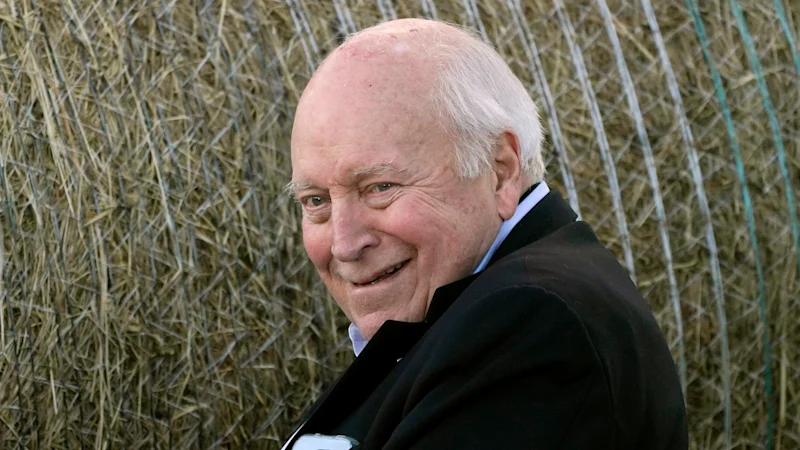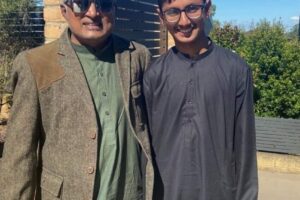
His campaign for a military response to the September 11 terrorist attacks in 2001 cleared the path for an unpopular second war in Iraq. Cheney alleged links between the attacks and Saddam Hussein’s regime in Iraq that didn’t exist, said there was “no doubt” the Iraqi dictator was stockpiling weapons of mass destruction. He also claimed that US forces would be welcomed in Iraq as liberators.
Centre of attention: Cheney (centre, left) played a much larger White House role than many previous deputies.Credit: THE WHITE HOUSE
When the US invaded Iraq in 2003, Saddam was quickly unseated, but the country dissolved into a chaotic and bloody security vacuum that led to years of brutal civil war and the rise of extremist groups, including Islamic State. The war also aided the expansion of Iranian influence.
Cheney’s reputation suffered when no chemical stockpiles were found, the US military became ensnarled in sectarian fighting, and public support for the war evaporated.
He never publicly acknowledged that his rationale for the war was wrong, but saw his influence wane during George W. Bush’s second term in office.
The hunting incident
In February 2006 it emerged that Cheney had accidentally shot and injured 78-year-old Texan lawyer Harry Whittington – but 24 hours elapsed before the White House confirmed what had happened, and some details still remain murky.
Whittington was reportedly shot while the two men were taking part in a quail hunt at a friend’s ranch in south Texas, in an episode Cheney later described as “one of the worst days of my life”.
Clear shot: Cheney seen hunting in 2002.Credit: AP
Whittington – who suffered a minor heart attack and injuries to his face, chest, and neck – recovered after hospital treatment and quickly forgave Cheney, but the episode provided a rich seam of material for comedians and late-night TV hosts, who roasted him for months.
Health issues
Over the course of his life, Cheney suffered five heart attacks, starting in 1978, and had the fourth in November 2000, as Bush’s election hinged on a recount in Florida. A defibrillator was implanted in his chest in June 2001 to control episodes of rapid heartbeats. He revealed in his memoir that, two months after taking office, he “took the extraordinary step of writing a letter of resignation as vice president”, to be delivered should he become medically incapacitated.
Cheney pictured in 1999, ahead of his return to the White House as vice president.Credit: Fairfax
In 2007, Cheney had the defibrillator modified to disable its wireless function over fears that terrorists or other enemies could hack into it and potentially use it to kill him.
The move raised eyebrows among fans of the TV show Homeland, who had watched that exact scenario unfold onscreen.
His views on Donald Trump
Years after leaving office, Cheney became a target of US President Donald Trump, especially after his daughter Liz Cheney became the leading Republican critic and examiner of Trump’s attempts to stay in power after his 2020 election defeat and his actions in the January 6, 2021, riot at the Capitol.
She concluded the incident on January 6 was an “attempted coup” and a direct result of the defeated president’s effort to overturn the 2020 election.
Wyoming congresswoman Liz Cheney, Republican royalty and daughter of former vice-president Dick Cheney, was called a RINO (Republican in name only) by Donald Trump for voting to impeach him. Credit: AP
“President Trump summoned a violent mob,” Liz Cheney, who at the time represented Wyoming in the House of Representatives, said during the public hearings into the January 6 event, for which she served as vice chair.
“When a president fails to take the steps necessary to preserve our union – or worse, causes a constitutional crisis – we’re in a moment of maximum danger for our republic.”
Cheney then backed his daughter in a TV advertisement during her unsuccessful bid for re-election, saying: “In our nation’s 246-year history, there has never been an individual who was a greater threat to our republic than Donald Trump,” going on to label Trump “a coward”.
Then came a twist which Democrats of his era could never have imagined, with Cheney last year saying he would vote for their candidate, Kamala Harris, for the presidency.
Trump made no public remarks about Cheney in the hours after his death was disclosed. The White House lowered flags to half-mast in remembrance of him, but without the usual announcement or proclamation praising the deceased.
The president was not so quiet on the campaign trail last year, telling conservative commentator Tucker Carlson that he was “never a fan”.





